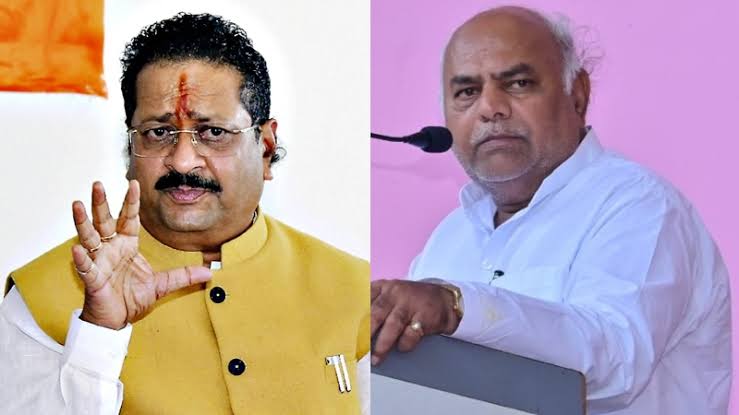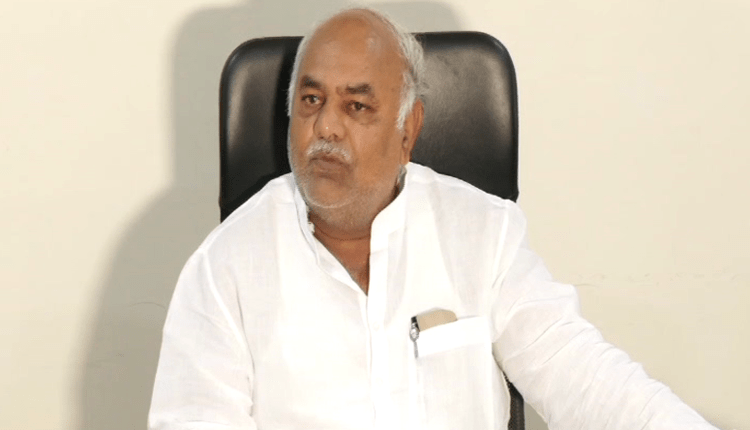In a dramatic escalation of Karnataka’s political tensions, Textiles and Sugar Minister Shivanand S Patil resigned as MLA from Basavana Bagevadi on May 2, 2025, challenging expelled BJP leader Basanagouda Patil Yatnal to quit his Bijapur City seat and face him in a by-election. The move, which risks triggering a high-voltage electoral showdown between two Lingayat heavyweights, has exposed deep fissures in the state’s political landscape. Here’s an in-depth analysis of the confrontation, its roots, and its implications for Karnataka’s governance.
Constitutional experts are divided on whether Speaker U T Khader can legally accept Shivanand Patil’s resignation, which is contingent on Yatnal’s departure. While Article 190(3) of the Indian Constitution grants Speakers the authority to verify resignations, no provision exists for conditional resignations. The Supreme Court’s 2010 ruling in Rajendra Singh Rana vs. Swami Prasad Maurya mandates that resignations must be “voluntary and unconditional,” setting a potential roadblock for Patil’s strategy. Legal analysts suggest Khader may reject the resignation outright, citing procedural impropriety, or seek the Election Commission’s guidance to navigate this uncharted territory.


The Resignation Gambit: A Conditional Challenge
Shivanand Patil, a four-time MLA from Basavana Bagevadi, submitted his resignation to Assembly Speaker U T Khader with a critical caveat: it should be accepted only if Yatnal also resigns. The provocation followed Yatnal’s crude public dare on April 29, where he challenged Patil and Hunagund MLA Vijayanand Kashappanavar to “prove their manhood” by resigning and contesting against him. Patil’s letter explicitly stated: “I request you to accept my resignation only after Basanagouda Patil Yatnal resigns from his MLA post.”
Yatnal, meanwhile, has yet to submit his resignation, leaving the ball in his court. Political analysts suggest the BJP dissident is weighing his options, including the possibility of floating a Hindu-centric party-a threat he first made in March 2025 after his expulsion from the BJP.
The Lingayat community, comprising 17% of Karnataka’s population, holds the key to power in 50+ assembly seats. Yatnal’s aggressive posturing as a “true Lingayat leader” aims to position him as the community’s sole representative, sidelining BJP stalwarts like B.S. Yediyurappa. However, Shivanand Patil’s grassroots appeal, built over four terms in Basavana Bagevadi, presents a formidable counter. Political strategists warn that a split in Lingayat votes could benefit Congress in northern Karnataka, where the BJP has traditionally dominated.
Roots of the Rivalry: Lingayat Politics and Personal Attacks
The feud between Patil and Yatnal is rooted in Lingayat community dynamics and escalating personal slurs:
-
Caste Identity: Yatnal accused Patil of changing his surname from Hachdadh to Patil to exploit caste affiliations-a charge Patil denies.
-
Religious Polarization: Yatnal has repeatedly targeted Patil for relying on Muslim votes, even calling him an “agent of Pakistan”-a remark that sparked protests by Congress workers.
-
Historical Tensions: Yatnal, a former Union Minister of State for Railways (2003–04), has a history of anti-Muslim rhetoric, including advising corporators to “work only for Hindus.” His 2023 remark comparing Muslims to “Tipu Sultan’s followers” drew national condemnation.
Shivanand Patil’s dual role as Textiles and Sugar Minister adds complexity to the crisis. Karnataka’s ₹12,000 crore textile industry, centered in Vijayapura and Bagalkot, faces uncertainty over pending subsidies for power loom upgrades. Similarly, sugar mills in the Krishna basin await his approval for fair price recommendations ahead of the 2025-26 crushing season. A prolonged political standoff could delay these decisions, impacting 500,000+ workers and farmers across the state.
Legal and Procedural Hurdles
Speaker U T Khader faces a constitutional quandary:
-
Resignation Validity: The Speaker must verify if Patil’s resignation is voluntary and genuine, as mandated by the Supreme Court’s 2010 guidelines.
-
Conditional Precedent: No precedent exists for a resignation contingent on another MLA’s departure. Legal experts argue Khader could reject Patil’s request, citing procedural irregularities.
-
By-Election Timeline: If both resignations materialize, the Election Commission must hold polls within six months, potentially disrupting legislative business.
Shivanand Patil’s resignation was strategically announced via a primetime press conference, leveraging regional news channels and social media to frame the narrative as a “test of courage” for Yatnal. BJP’s IT cell countered with hashtags like #CongressCowardice, alleging Patil’s move was a “diversion tactic” to mask governance failures. Meanwhile, Yatnal’s team circulated videos of his past speeches on WhatsApp groups, targeting Lingayat-dominated villages in Vijayapura to reinforce his “community savior” image. The battle for narrative control highlights how digital platforms are becoming critical battlegrounds in Karnataka’s political wars.


Broader Political Implications
The confrontation risks destabilizing Karnataka’s Congress government and BJP’s internal cohesion:
-
Congress Calculations: Patil’s move is seen as an attempt to corner Yatnal and force the BJP to discipline its rebel, who retains influence in Vijayapura.
-
BJP’s Dilemma: With Yatnal expelled until 2031, the BJP must decide whether to tacitly support him (risking ideological dilution) or back a fresh candidate (alienating his base).
-
Third Front Speculation: Yatnal’s proposed “Hindu party” could fragment Lingayat votes, aiding Congress in its bid to retain power in 2028.
Yatnal’s history of incendiary remarks, including calls to “boycott Muslim traders,” threatens to inflame tensions in Vijayapura, where communal clashes in 2022 left three dead. Civil society groups have petitioned the National Human Rights Commission (NHRC) to monitor his rhetoric, while the Congress government faces pressure to invoke the National Security Act (NSA) against hate speech. The Election Commission’s Model Code of Conduct, however, remains inactive until polls are officially notified.
The Road Ahead: Scenarios and Consequences
-
Status Quo: If Yatnal refuses to resign, Patil could retract his resignation, but his credibility would take a hit.
-
By-Election Showdown: A direct contest would test Yatnal’s claim of being the “true Lingayat leader” against Patil’s grassroots network.
-
Third Front Launch: Yatnal’s Hindu party could attract disgruntled BJP workers, reshaping Karnataka’s opposition landscape.
The BJP’s handling of Yatnal could set a precedent for managing dissidents ahead of the 2029 Lok Sabha elections. With hardliners like Yatnal advocating for a more radical Hindutva agenda, the party risks alienating moderate voters if it fails to rein him in. Conversely, embracing his rhetoric might consolidate the Hindu base but jeopardize alliances with JD(S) or other regional players. For Congress, the crisis offers a chance to project stability while exploiting BJP’s internal fractures.
Public and Party Reactions
-
Congress Stance: CM Siddaramaiah has cautiously backed Patil, calling Yatnal’s remarks “unbecoming of a legislator.”
-
BJP Silence: State president BY Vijayendra has avoided comment, reflecting the party’s discomfort with Yatnal’s radicalism.
-
Civil Society: Activists have condemned the communal rhetoric, urging EC to enforce the Model Code of Conduct strictly.
Both parties are scrambling to capture the youth vote, with Congress launching “Yuva Nidhi”-a ₹3,000 monthly stipend for graduates-and BJP countering with promises of “startup hubs” in tier-2 cities. However, Gen-Z voters in urban centers like Hubballi and Mysuru remain skeptical, citing unemployment (8.1% in Karnataka) and climate crises as top concerns. Political analysts note that neither Patil’s resignation nor Yatnal’s rhetoric addresses these issues, risking alienation of a demographic that constitutes 34% of the electorate.
Historical Context: Yatnal’s Controversial Career
-
1994–1999: First elected as MLA from Bijapur on a Janata Dal ticket.
-
1999–2009: Served two Lok Sabha terms, becoming MoS for Textiles and Railways under Vajpayee.
-
2018–Present: Returned to state politics, winning Bijapur City on BJP ticket.
-
2025 Expulsion: Ousted for attacking BS Yediyurappa’s family, his third expulsion since 2010.
Lingayat women, traditionally swayed by community leaders, are emerging as independent voters, with self-help groups and Anganwadi networks becoming key campaign channels. Congress’s “Shakti” scheme-free bus travel for women-has gained traction, but BJP’s emphasis on “Hindu family values” through Yatnal’s speeches complicates their outreach. Surveys indicate 60% of women voters prioritize inflation and safety over caste allegiances, a shift both parties struggle to address.


Economic and Social Fallout
The turmoil risks delaying key decisions on textile subsidies and sugar MSPs, sectors under Patil’s ministry. Farmers in Vijayapura, Karnataka’s second-largest sugarcane belt, fear policy paralysis. Meanwhile, Yatnal’s communal narratives threaten social harmony in a region with a 18% Muslim population.
Expert Analysis
-
Prof. Harish Ramaswamy (Political Analyst): “This is less about ideology and more about ego. Both leaders are playing a dangerous game with Lingayat unity.”
-
Advocate Vinay Sarpal (Constitutional Expert): “The Speaker lacks the authority to link two resignations. Patil’s move is symbolic, not substantive.”
What’s Next?
All eyes are on Basanagouda Yatnal, whose next move could either defuse the crisis or plunge Karnataka into a bruising electoral battle. For Congress, the priority is ensuring Patil’s gambit doesn’t backfire, while the BJP must contain the fallout of its rebel’s brinkmanship. As the Speaker deliberates, one thing is clear: Karnataka’s political theater just got a blockbuster sequel.
This comprehensive breakdown captures the high-stakes drama unfolding in Karnataka, where personal rivalries and caste calculus are reshaping the road to 2028.
A Public Interest Litigation (PIL) filed in the Karnataka High Court seeks to bar candidates with hate speech charges from contesting-a direct challenge to Yatnal’s eligibility. Simultaneously, the Election Commission is under pressure to fast-track pending criminal cases against legislators, including 12 from Karnataka. Legal experts warn that judicial overreach could spark a “constitutional crisis” if courts intervene in resignation disputes traditionally under the Speaker’s purview.
The crisis coincides with stalled negotiations over Karnataka’s ₹18,177 crore drought relief plea, which the Centre has yet to approve. BJP MPs accuse CM Siddaramaiah of “politicizing disasters”, while Congress claims “deliberate neglect” to weaken its governance record. With PM Modi’s “400 paar” slogan for 2024 now echoing in state politics, the confrontation risks derailing cooperative federalism on critical issues like water-sharing and infrastructure funding.
Follow: Karnataka Government
Also Read: ₹58,000 Crore Boost in Amaravati: PM Modi Ignites Andhra’s Growth Engine

